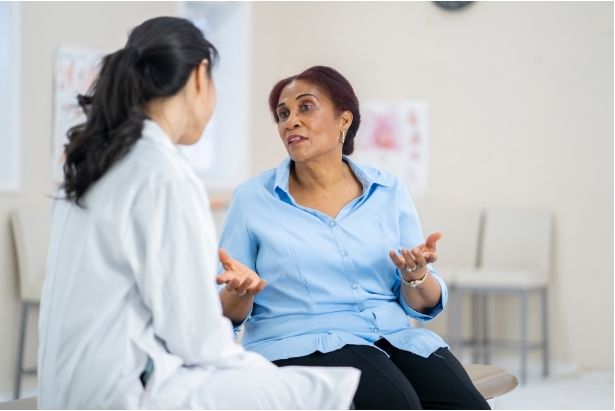Dealing with a New Cancer Diagnosis
Receiving a cancer diagnosis is a life-altering moment. Once diagnosed, cancer patients are confronted with managing a serious health condition that will impact every aspect of their lives. Learning more about what to expect during your cancer journey and seeking knowledge and support can make a big difference in smoothing the way.
The Emotional Impact of a Cancer Diagnoses
The moment a doctor utters the word cancer can feel like a sudden plunge into darkness. In an instant, your life has completely changed, and it is natural to experience a range of intense emotions throughout your experience. Many new cancer patients will feel denial, anger, sadness, and fear. If you are diagnosed, you may ask “Why me?” or “What did I do to deserve this?”
Let the Emotions Come
Understanding your emotions and accepting them, no matter what they are, can help you get through them. Some patients may want to try and ignore their emotions or talk themselves out of confronting them by thinking or saying, “I shouldn’t feel this way” or “Feeling negative emotions is a waste of energy.”
As humans, we all have emotional reactions when presented with challenges. And whether we acknowledge our emotions or not, they impact what we think, how we feel, and the actions we take. If you are dealing with a serious health diagnosis, it’s especially important to give yourself permission to be human and let the emotions come. It may be overwhelming or even unfair but dealing with the emotional turmoil of a cancer diagnosis is one of the many challenges you will face.
Add Mental Healthcare to Your Treatment Plan
For cancer patients, we encourage you and your care team to include mental health in your cancer treatment plan. Mental healthcare can benefit everyone and can be especially helpful to those dealing with a serious health diagnosis. Mental and behavioral healthcare can help provide you with a healthy outlet for your feelings and equip you with practical coping skills.
There are many ways mental health support can be added to your care plan and we encourage you to find what works for you. Some people benefit from one-on-one talk therapy with a trained counselor. Others prefer to participate in support groups where they can talk with others dealing with similar challenges. Some patients may take meditation classes while others prioritize physical challenge through exercise. Your mental healthcare approach can be as unique as you are.
Understanding your Diagnosis
There’s a saying that “knowledge is power” and, for many, it can help you feel more in control and prepared for your cancer journey. Finding out as much as you can about your diagnoses and your treatment options also allows you to take an active role in your care.
Ask Questions

When it comes to asking questions, we believe that any question you have is one worth asking. When dealing with a cancer diagnosis, many patients may feel overwhelmed and intimidated when talking to their doctor. It’s common to feel hesitant to ask questions due to fear or embarrassment. Rest assured that your provider is committed to educating you about your diagnosis and knows that answering questions is a critical part of their job. Asking questions shows your provider that you are engaged and want to be an informed participant in your own care.
Use Trustworthy Sources
When doing cancer research, we encourage you to seek qualified people and creditable information sources. Look for information on topics like treatment options and efficacy from qualified clinical professionals. Inspiration and encouragement from other survivors or caregivers can be very helpful, but it’s important to understand that your cancer diagnosis is unique to you and only a healthcare professional who understands your medical history should be trusted to provide medical information and advice.
At BHA, our medical providers recommend patients look to organizations like the American Cancer Society and the CDC to provide valuable, trustworthy resources. Check out a list of resources at the end of this article.
Getting the support you need on your cancer journey
No one needs to go through cancer alone. Your healthcare providers, family, friends, and other survivors are here to walk with you on this difficult path.
Connect the Pros
Once you have a cancer diagnosis, your healthcare team will get a little bigger. In addition to your primary care doctor and oncologist, you may also need to see other specialists like pathologists, surgeons, and radiologists.
It’s important that all your providers stay in the loop and up to date on all your treatments. Make sure that all your providers know to keep your primary care doctor informed of your care plan and report each time you receive care. Many medical practices have clinical staff who offer “triage” services that can help you connect to resources as well act as a central hub for tracking your care and keeping your medical record up to date.
Find a Buddy
Cancer treatment can be a lot to manage, and patients can rack up many hours of appointments at different facilities and with multiple healthcare providers. Consider inviting a trusted friend or family member to help manage your care plan. You may simply need a hand keeping your schedule straight or pick up a prescription for you. Or you may want someone to come with you to appointments to be a second set of ears or to take notes. If someone you know asks you, “How can I help?” take them up on the offer and make them your buddy!
Join a Support Group
 Joining cancer support groups can be immensely beneficial in navigating a cancer diagnosis. The American Cancer Society (ACS) offers the Cancer Survivors Network (link), which hosts many online support groups for people with current and past cancer diagnoses and their care givers. ACS has dozens of different groups devoted to specific types of cancer.
Joining cancer support groups can be immensely beneficial in navigating a cancer diagnosis. The American Cancer Society (ACS) offers the Cancer Survivors Network (link), which hosts many online support groups for people with current and past cancer diagnoses and their care givers. ACS has dozens of different groups devoted to specific types of cancer.
Many people dealing with cancer find that connecting with others who have a similar diagnosis is helpful to their emotional wellbeing. In addition to the emotional support, group members can offer each other first-hand experience and practical advice that may help you live more comfortably with cancer.
You can do this
As more and more Americans learn every day, life with cancer is tough and impacts nearly every aspect of your daily life. We hope that having good information and quality support helps you deal with your diagnosis and find moments of comfort in your journey.
Resources for cancer patients:
American Cancer Society’s (ACS) Cancer Survivors Network
ACS: Coping and Living Well During Cancer Treatment
ACS: Understanding Cancer


















































































































































